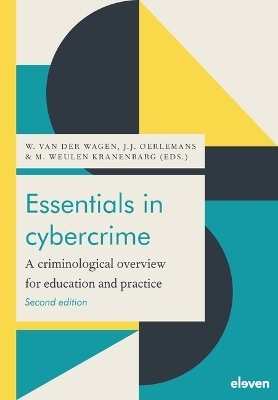
Essentials in cybercrime
Eleven International Publishing (Verlag)
978-90-473-0212-4 (ISBN)
This textbook is intended for students and professionals seeking to deepen their understanding of the criminological, technical, and legal aspects of cybercrime. It offers an excellent introduction and essential knowledge of cybercrime at your fingertips.
Over de auteursDr. Wytske van der Wagen is a criminologist specialised in cybercrime. In 2018 she obtained her PhD from the University of Groningen with her thesis entitled: From cybercrime to cyborg crime: An exploration of cybercrime, offenders, and victims through the lens of actor-network theory. Hereafter she worked as an assistant professor in Criminology at Erasmus University. She has been involved in cybercrime education since 2011. Her expertise lies mainly in cyber offending/offenders, (cyber)criminological theories, and the human-technology nexus.
Prof. dr. Jan-Jaap Oerlemans is assistant professor in Criminal law at Leiden University and an endowed professor in Intelligence and law at Utrecht University. His research and publications focus on cybercrime, digital investigations, and national security. For a long time, he combined his academic work with legal practice. From 2017-2023, he worked as a supervisor at the Dutch Review Committee on the Intelligence and Security Services (CTIVD).
Dr. Marleen Weulen Kranenbarg is assistant professor in criminology at the Department of Criminology of the Vrije Universiteit (VU) Amsterdam. Her research focuses mainly on four themes around cybercrime offending and prevention: 1. differences with traditional crime 2. the role of online and offline peers 3. the role of (IT) education and 4. ethical hacking and positive use of IT skills. She has been involved in bachelor and master education about cybercrime since 2014.
Dr. Wytske van der Wagen is a criminologist specialised in cybercrime. In 2018 she obtained her PhD from the University of Groningen with her thesis entitled: From cybercrime to cyborg crime: An exploration of cybercrime, offenders, and victims through the lens of actor-network theory. Hereafter she worked as an assistant professor in Criminology at Erasmus University. She has been involved in cybercrime education since 2011. Her expertise lies mainly in cyber offending/offenders, (cyber)criminological theories, and the human-technology nexus. Prof. dr. Jan-Jaap Oerlemans is assistant professor in Criminal law at Leiden University and an endowed professor in Intelligence and law at Utrecht University. His research and publications focus on cybercrime, digital investigations, and national security. For a long time, he combined his academic work with legal practice. From 2017-2023, he worked as a supervisor at the Dutch Review Committee on the Intelligence and Security Services (CTIVD). Dr. Marleen Weulen Kranenbarg is assistant professor in criminology at the Department of Criminology of the Vrije Universiteit (VU) Amsterdam. Her research focuses mainly on four themes around cybercrime offending and prevention: 1. differences with traditional crime 2. the role of online and offline peers 3. the role of (IT) education and 4. ethical hacking and positive use of IT skills. She has been involved in bachelor and master education about cybercrime since 2014.
1 Introduction; 2 Cybercrime in a criminological perspective; 3 Types of cyber-dependent crime and their criminalisation; 4 Types of cyber-enabled crime and their criminalisation; 5 Cyber offenders; 6 Cybercriminal networks; 7 Cybercrime victimisation; 8 Criminological theories and cybercrime; 9 Cybercrime investigations; 10 Interventions for cyber offenders
| Erscheinungsdatum | 22.08.2024 |
|---|---|
| Verlagsort | Utrecht |
| Sprache | englisch |
| Maße | 170 x 240 mm |
| Themenwelt | Recht / Steuern ► Strafrecht ► Kriminologie |
| ISBN-10 | 90-473-0212-5 / 9047302125 |
| ISBN-13 | 978-90-473-0212-4 / 9789047302124 |
| Zustand | Neuware |
| Haben Sie eine Frage zum Produkt? |
aus dem Bereich


